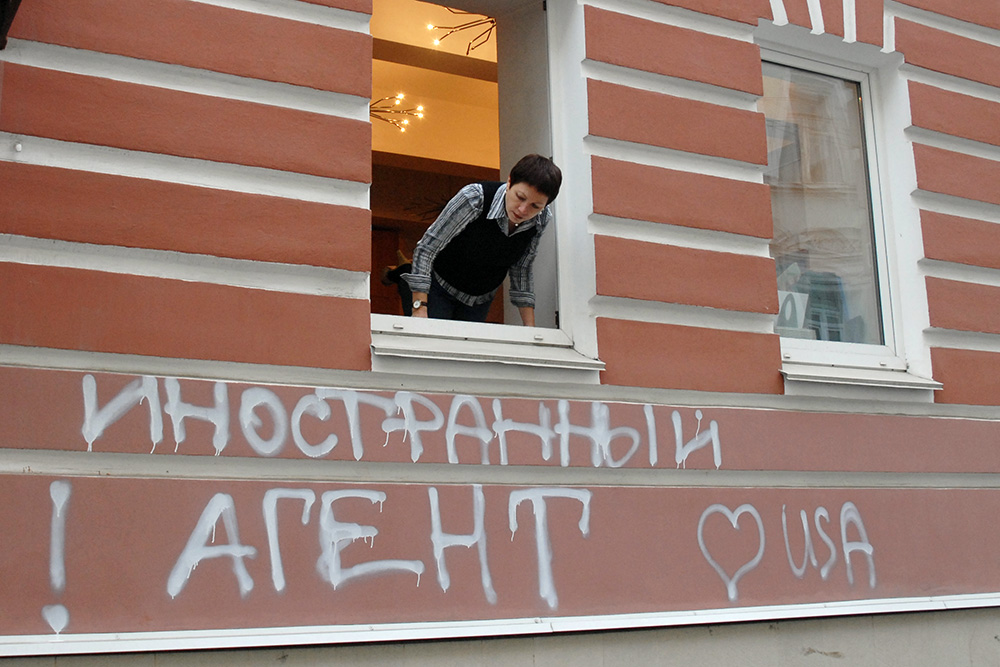By Sean Guillory.
May 6 is the first anniversary of the Bolotnaya protests that erupted in violence. Twenty-eight people and possibly more await prosecution. Bolotnaya has also served as the impetus to link Left Front leader Sergei Udaltsov to a wider conspiracy where he, Leonid Razvozzhaev (who confessed then retracted it claiming it was given under torture), and Konstantin Lebedev (who has confessed and is cooperating with the Investigative Committee) of planning a coup financed with Georgian (i.e. American) money. I discussed the significance of Bolotnaya on the Power Verticalpodcast on Friday. There I stressed that what Bolotnaya represents is Putin adopting Stalin’s ominous maxim made in reference to the 1928 Shakhty Trial: “We have internal enemies. We have external enemies.”
While I caution against any comparison between Putin and Stalin, the existence of the internal/external enemy duumvirate is clearly apparent. In fact, Forbes.ru‘s Aleksandr Morozov put it at the center of his article, “Cold War-2013: What Grew Out of the 2012 Protests.” Morozov makes some interesting observations about the state of things a year after Bolotnaya.
Namely:
As I alluded on the podcast, the internal/external enemy is the guiding principle of Putin and Investigative Committee chief Aleksandr Bastrykin’s effort to discredit the opposition. Interestingly, however, there are indications the circle of internal-external enemies might be expanding to include Medvedev’s circle.
This last point was the subject of a recent Novaya gazeta article that connected the criminal investigation against Aleksey Beltyukov, Senior Vice President of the Skolkovo Fund, and the payment of $750,000 to Just Russia Duma deputy and street oppositionist Ilya Ponomarev to Dmitry Medvedev (who is the face of Skolkovo) and Vladislav Surkov (who supervises Skolkovo). Essentially, paying Ponomarev an enormous amount of money for ten lectures and scientific research is an “indirect but quite transparent hint” that Medevdev and Surkov are funding the street opposition.
In a similar vein, Morozov notes an effort to connect Medvedev’s “liberalism” and “foreign agents.” This is a further indication that the tandem is dead (did anyone think it was still alive?) and that Medvedev is a “delinquent member of the family” without “the means to win forgiveness.” Hence, the campaign to discredit him and his circle. In one of the stranger facts, a Yandex search for “Dvorkovich is a British agent,” i.e. Arkady Dvorkovich, Medevdev’s right-hand man and silovik mandarin Igor Sechin’s arch-nemesis, unearths 120,000 links. Even weirder is that this claim is attributed to American freakazok-in-chief, Lyndon LaRouche. Yes, that is how kooky the smear campaign has gotten. The message however muddled is clear: Medvedev is not one of “us.”
The extension of the umbrella of Otherness goes further. Morozov explains there is an effort to dehumanize oppositionists of all stripes. “The enemy must lose human features and be turned into “nonhumans”, beasts, insects, ‘livestock,’ and ‘larva,’” he writes. This effort to dehumanize the enemy is harrowing for anyone who knows Soviet history. Things haven’t gotten to an Andrei Vyshinsky level of dehumanization, though. Vyshinsky was a maestro of bestial adjectives. During the show trials of the 1936-38, the Soviet state prosecutor cast the defendants as rabid dogs, venomous snakes, swine, among others, who “sold themselves to enemy intelligence services.” This is why the “foreign agent” label for Russian NGOs stirs so much controversy, ire, disgust, and foreboding.
Morozov, however, has a larger characterization of the state of things beyond of the friend-enemy distinction. True to his article’s title, Morozov sees the situation between the authorities and the opposition as a “cold civil war.” And, in his opinion, this only gives Putin the advantage.
It gives [Putin] the possibility to mobilize the “People’s Front,” a new form of political and electoral support. A year after the inauguration, the features of the new regime are clearly replacing the conception of rule through the “dominant party.” If Putin ruled in his first and second terms relying on the electoral and ideological pseudo-competition between United Russia and other parties respecting the norms of “illiberal democracy,” then there will now be another system.
In order for the People’s Front to work it’s necessary to permanently keep non-party “forms of the enemy” alive. The People’s Front isn’t facing off against local party structures, but against a global plutocracy with a fifth column inside the country.
Those who protested a year ago against electoral violations and spoke for institutional reforms think that political inclusion is better than exclusion. But it will be hard to adapt them if you consider them “enemies of the state” and not loyal citizens. But it’s necessary to look at reality in the eyes. There is a “front” and there are “the people.”
And if we accept Morozov’s diagnosis of the current conjecture, the internal-external enemy matrix will be around for a long time. In fact, it seems to be a basis of Putin’s domestic rule. If true, this places the opposition in a complicit position in Putin’s master plan. Yes, most want a seat at the table. They aren’t revolutionaries. But if that seat is continually denied, or the pressure keeps increasing, as it undoubtedly will, more and more of them will radicalize, giving Putin the perpetual flow of “enemies of the state” he requires.



